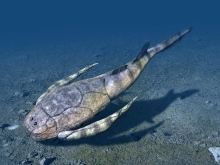Tracing the Evolutionary Origins of Fish to Shallow Ocean Waters

The first vertebrates on Earth were fish, and scientists believe they appeared around 480 million years ago. But fossil records from this time are spotty, with only small fragments identified. By 420 million years ago, however, the fossil record blossoms, with a huge variety of fish species present en masse.
“It’s been this ongoing question of, well, where were they?” says paleobiologist Lauren Sallan, Martin Meyerson Assistant Professor in Interdisciplinary Studies. “Where were they hiding? What were their environmental origins?”
Sallan and colleagues are the first to present a wealth of evidence to answer that question in a report in the journal Science. And the answer, it seems, is near shore, the areas often described as the intertidal zone, or shallow lagoons.
“In modern conceptions, we see that coral reefs are so important for fish biodiversity, so we assume there’s an ancient link between fishes and reefs going back to the beginning,” says Sallan. “But decades of searching in places like the Cincinnati Arch have come up empty. Instead, our work shows that almost every major vertebrate division, from the earliest armored jawless fish all the way up through sharks and our own ancestors, all started out right near the beach, far inshore of the reef. Even as older groups spread out, newer groups were also appearing at the shoreline.”
Read the full story here.





